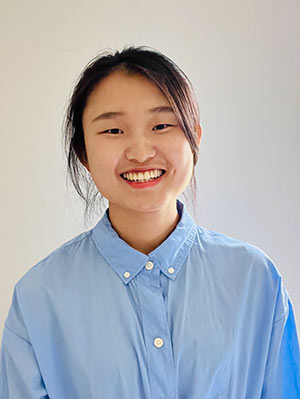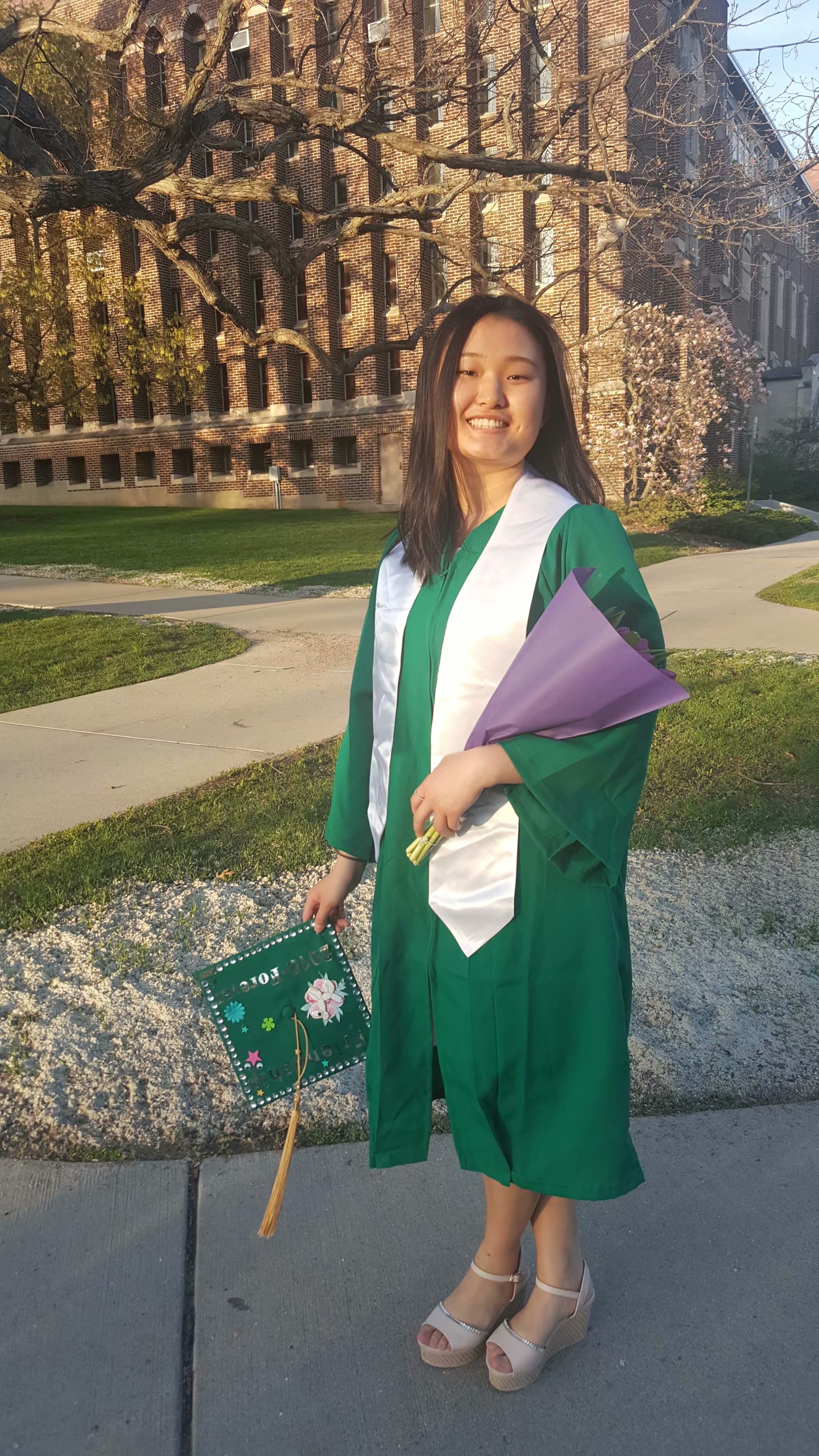From Psych Major to HDFS Doctoral Candidate: A Spotlight on Qi Huang
June 11, 2024 - Shelly DeJong
 Qi Huang is a fourth-year Human Development and Family Studies (HDFS) doctoral candidate and an undergraduate alum of the MSU Department of Psychology. After attending high school in Rockford, Michigan, as an exchange student from China, Huang decided to stay in Michigan for her education and soon after enrolled at Michigan State University.
Qi Huang is a fourth-year Human Development and Family Studies (HDFS) doctoral candidate and an undergraduate alum of the MSU Department of Psychology. After attending high school in Rockford, Michigan, as an exchange student from China, Huang decided to stay in Michigan for her education and soon after enrolled at Michigan State University.
We sat down with Huang recently to talk about her journey from undergraduate student to doctoral candidate, her dissertation research on international students facing academic dismissal, and what advice she has for international students navigating higher education.
What experiences as an undergraduate helped you find your path?
Working in Organizational Psychologist Dr. Ann Marie Ryan’s lab as an undergraduate student really developed my passion for research. It showed me how cool it is that you can do scholarly work and hopefully create positive changes in society. In one research project, we examined minority police officers' experiences in the face of professional stigmatization. That was a big reason I decided to pursue a doctorate degree after I graduated. I found a sense of purpose and fulfillment as I realized the transformative potential research has in addressing complex challenges. My honors thesis looked at the barriers women and Asian Americans face in advancing in organizations. I presented at the Diversity Research Showcase, and I won the Poster Presentation First Prize Award. I was proud of that and felt encouraged that research was something I could do well while also enjoying.
I also interned with MSU's Office for International Students and Scholars where I worked with international students facing academic risk or mental health emergencies. I translated in Mandarin during meetings between students, families, and university staff. That experience really helped me to learn about the unique challenges and needs of international students. This experience helped me decide that I should pursue a doctorate degree to understand international students’ complex experiences better and to research how universities can tailor their programs to better support marginalized student populations.
Later I learned that there's a faculty at HDFS, Dr. Desiree Qin, who does wonderful research with international students. I reached out to her asking if I could take part in her research, and she was very generous and let me get involved. I found it so interesting, so I applied to be her graduate student.
Your dissertation topic looks at Chinese international students who are facing academic dismissal. Could you talk about that a little bit?
Going back to my internship with MSU’s Office for International Students and Scholars, I interacted with a lot of international students who had been placed on academic probation. I didn't realize that was a thing until I started interacting with them. I noticed that after they were dismissed, we really lost their voices. We didn’t know where they went or how life was afterwards. I think there's just a lot of unknown in there. After working closely with the students and their families, I became aware of the multifaceted challenges they encountered compared to domestic students. One example is that dismissed international students may face immigration consequences, including the potential loss of their student visa status, which could lead to difficulty obtaining future visas for studying or working in the country.
 Therefore, I decided to develop my dissertation on this topic to understand the factors contributing to their dismissal status, to learn how they navigated that process, and to see if there are things that can be done to better support international student populations at the institutional level. At the individual level, it’s important for students to fulfill their responsibilities by completing their work. However, it’s equally crucial to investigate the systemic barriers that hinder their access to essential support resources at the institutional level. I reached out to the students I had formerly worked with, and most of them generously shared their stories with me. It’s a sensitive topic, so I feel grateful that they trusted me with their experiences.
Therefore, I decided to develop my dissertation on this topic to understand the factors contributing to their dismissal status, to learn how they navigated that process, and to see if there are things that can be done to better support international student populations at the institutional level. At the individual level, it’s important for students to fulfill their responsibilities by completing their work. However, it’s equally crucial to investigate the systemic barriers that hinder their access to essential support resources at the institutional level. I reached out to the students I had formerly worked with, and most of them generously shared their stories with me. It’s a sensitive topic, so I feel grateful that they trusted me with their experiences.
How does a psychology background influence your work?
My psychology background plays a big role in my work in developmental psychology. The foundational knowledge and understanding of psychological theories are really helpful in informing my research on minority populations. My undergraduate experiences in research labs equipped me with essential skills in both qualitative and quantitative research, providing me with a strong foundation for conducting rigorous and insightful studies.
What advice would you give to international students navigating higher education?
First, I want to acknowledge the unique challenges that international students face, such as cultural differences, language barriers, and adapting to a new educational system. I think it is important to recognize their courage and determination. Studying abroad is already a significant achievement.
My advice is to remain open-minded and embrace new perspectives and experiences even if they may seem to be unfamiliar or uncomfortable at first. Stepping out of one's comfort zone can lead to valuable opportunities for personal growth and discovery. It helps international students to explore different paths and uncover their passions and aspirations. Also, I encourage them to prioritize their health and seek help when needed. While academics are important, prioritizing safety and well-being should always come first. Seeking assistance, whether academic or emotional, is not a sign of weakness but a proactive step towards success. It is essential to build a support system by staying connected with family and friends. My last piece of advice is time management. Balancing academics and social life can be challenging, it is important to develop strong time management skills to stay on top of studies but also make time for relaxation and social activities.
What do you hope your impact will be?
I hope my work will make a positive impact in higher education institutions, particularly in supporting international student populations. I hope to provide a nuanced understanding of how these students cope with various challenges they encounter, contributing insights to academic literature, especially regarding their experiences with academic dismissal, which has been greatly underexplored. Ultimately, I aspire to contribute to the reform of institutional policies and practices, ensuring that support services are more accessible, culturally sensitive, and effective in addressing the diverse needs of student populations.
Has anyone at MSU helped you along your journey?
In psychology, I would like to give a shoutout to my faculty mentor during my undergraduate studies, Dr. Ann Marie Ryan. My experiences in her lab provided me with invaluable initial immersion in research, which sparked my interest in pursuing doctoral education. I appreciate that she was incredibly patient and offered the perfect level of support, allowing me to pursue topics that intrigued me without feeling overwhelmed by the complexities of research methodologies. She is a very experienced and outstanding mentor.
I would also like to express my appreciation for another mentor in the College of Social Science, Dr. John Waller, who is also the director of the Social Science Scholars Program. During my undergraduate years, I had the privilege of being part of the program, where I connected with a group of ambitious and talented peers. This program not only facilitated serious research opportunities but also bolstered my knowledge and confidence, making me a more attractive candidate for graduate school. Dr. Waller's guidance and support were instrumental in my growth as a scholar during this time.
Now in HDFS, I would like to recognize two mentors, Dr. Desiree Qin and Dr. Yijie Wang, for their enormous support in my research and scholarly work. They have provided me with invaluable advice and encouragement and helped me connect with other colleagues and professional networks. Their dedication to cultural diversity, encouragement of critical thinking, and respect for students from diverse backgrounds have profoundly shaped and enriched my journey as a doctoral student. I am deeply grateful for their tireless efforts in supporting not just my academic growth, but also my personal and professional development.

